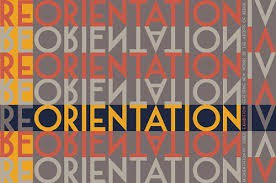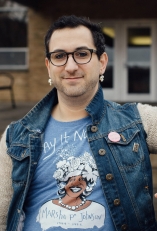 Lately, I have grown quite curious about conferences as locations of knowledge generation and distribution. As someone who has been facilitating workshops and educational sessions both at conferences and on college campuses with increasing regularity over the past two years, I have become especially interested in what happens with the knowledge that is created at such central locations as conferences. Put another way, what happens with what was said, shared, and discussed when we all pack up and head home to our respective campuses, workplaces, and organisations?
Lately, I have grown quite curious about conferences as locations of knowledge generation and distribution. As someone who has been facilitating workshops and educational sessions both at conferences and on college campuses with increasing regularity over the past two years, I have become especially interested in what happens with the knowledge that is created at such central locations as conferences. Put another way, what happens with what was said, shared, and discussed when we all pack up and head home to our respective campuses, workplaces, and organisations?
In thinking about this question, I was reminded of two stories, both of which highlight our various orientations—or lack thereof—to knowledge shared at conferences. Here, I think alongside Ahmed’s notion in her 2006 book Queer Phenomenology of orientations (see another Conference Inference post on this work) as recognizing that “certain objects [of knowledge] are available to us because of the lines we have already taken” (p. 21). In other words, we have been oriented toward—or away from, as the case may be—certain understandings of the (im)mobility of conference-based knowledges, and these orientations may require reorientations, or “a different ‘slant’ to the concept of orientation itself” (p. 4).
The first story is quite pithy, and involves a statement I have noticed I continue to share when presenting at conferences. That is, after I present my research I often find myself saying some variant of the following during the ensuing discussion: “my/our research is only as good as you [the audience members] taking it home and putting it to good use.”
The second story actually involves an administrative process I—and I assume others—have to engage in before I even make it to a conference. My host institution requires that I fill out some paperwork to justify my traveling to a conference. Whilst there are various views of such administrative oversight—as “good practice”; as a method of surveillance; as a practice in writing what is needed in order to gain access—I have been particularly interested in how the forms I fill out seek to elucidate my relation to the conference-based knowledge that will be created when I attend. Specifically, the forms I fill out ask if I will be presenting at the conference, but nothing else. The forms, then, only ask how I will add to the knowledge base at a conference, but not what I will take away from the conference. Moreover, the forms that determine my ability to access conferences spaces do not inquire as to how I will use the knowledge I gain once back at my host institution, if I will at all.
These two experiences have made me realize that we as educators actually have to work quite hard to reorient ourselves to the possibilities and potentialities of the mobility of conference-based knowledges. That is, we often start from the assumption that “what is shared at conference stays at conference.” I also see this as a manifestation of—and reinforced by—notions that academic conferences are a “break,” an “academic holiday,” or “time away” from work, notions I know I am guilty of investing in, as are many of my academic peers, I’m sure. If we view conferences as a “break,” then what happens at conferences is not part of our everyday. It resides in its own time, a “time away” from our regularly scheduled (academic) time. And as holidays are fun, and broken apart from work, there is no incentive to bring back knowledge when we return from our “break,” our “time away.”
When I invite people to think about how they will take conference-based knowledges home, I am doing so because I have been oriented neither to do this myself, nor to assume others will. When I am asked to fill out forms that only inquire what I will give in terms of knowledge, without asking what I will gain or, more importantly, how I plan to use what I gain, then I continue to be oriented toward viewing conferences as disconnected from my everyday work; I am oriented toward seeing conferences—and the knowledges created and distributed therein—as breakages in, and a holiday from, my work. I am not suggesting new questions be added to our institutional forms, but that we reorient ourselves to how we think about conferences as locations for knowledge production, and the (im)mobility of such knowledges.
Certainly, we can—and should—have some intense discussions about what knowledges are (re)produced in conference spaces. Indeed, some of this work is happening (e.g., Pryor, Garvey, and Johnson, 2017, Pride and Progress?), and I myself have been working with some colleagues to do some of this investigation in academic conference spaces. But bracketing the question of what knowledges are (re)produced for the moment, I do wonder what we do (not) do with the knowledges that are already available at conferences. Additionally, I wonder what this (not) doing says about how we are oriented toward conferences as sites of knowledge as well as sites of serious intellectual and practical work. I believe conferences should be fun, invigorating, and refreshing, yes; however, I wonder if we may need to break with the orientation toward conferences as a break. And perhaps if this can be done, we can begin to think collectively about how conference-based knowledges can (re)shape our work as educators and academics. Perhaps this different “slant” on conferences could even help us recognize further the potential of education as “a practice of freedom” (see hooks, 1994, Teaching to Transgress).
About Z Nicolazzo

Z Nicolazzo (pronouns: ze/hir) is an Assistant Professor in the Adult and Higher Education program and a faculty associate in the Center for the Study of Women, Gender, and Sexuality at Northern Illinois University. Z’s first book, Trans* In College: Transgender Students’ Strategies for Navigating Campus Life and the Institutional Politics of Inclusion, was recently released by Stylus Publishing. Z has also published in the Journal of LGBT Youth, Journal of College Student Personnel, International Journal of Qualitative Studies in Education, and TSQ: Transgender Studies Quarterly. You can follow Z on Twitter at @trans_killjoy as well as on hir website at www.znicolazzo.weebly.com.

One thought on “Guest post by Z Nicolazzo: “It Only Matters If You Put It Into Practice”: The (Im)mobility of Conference Knowledge”